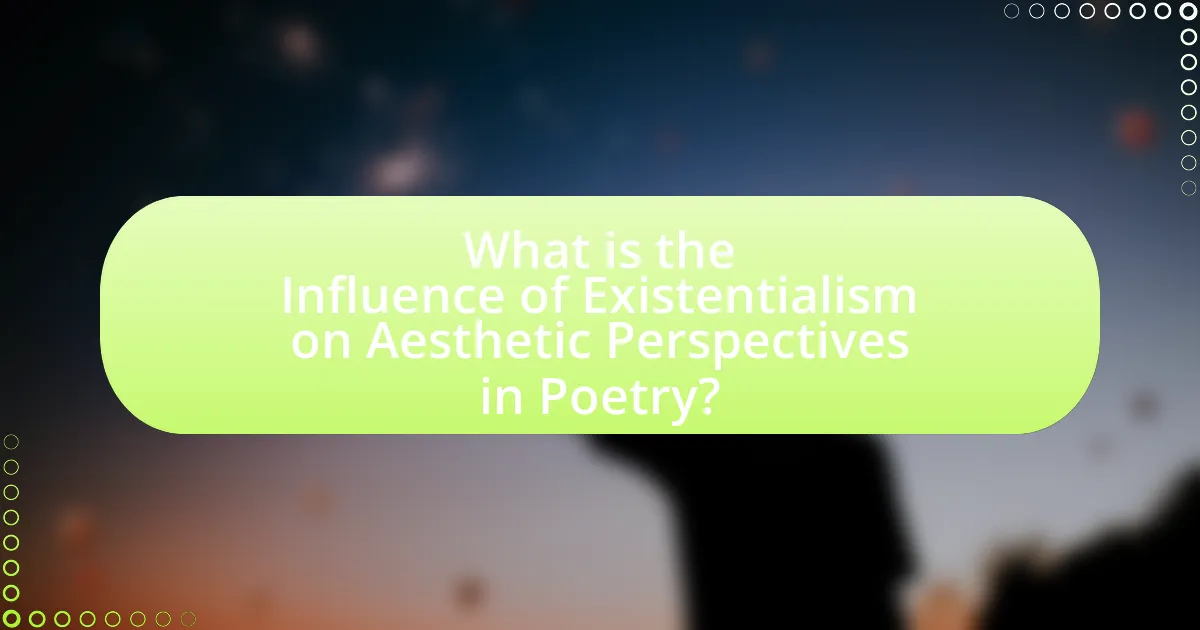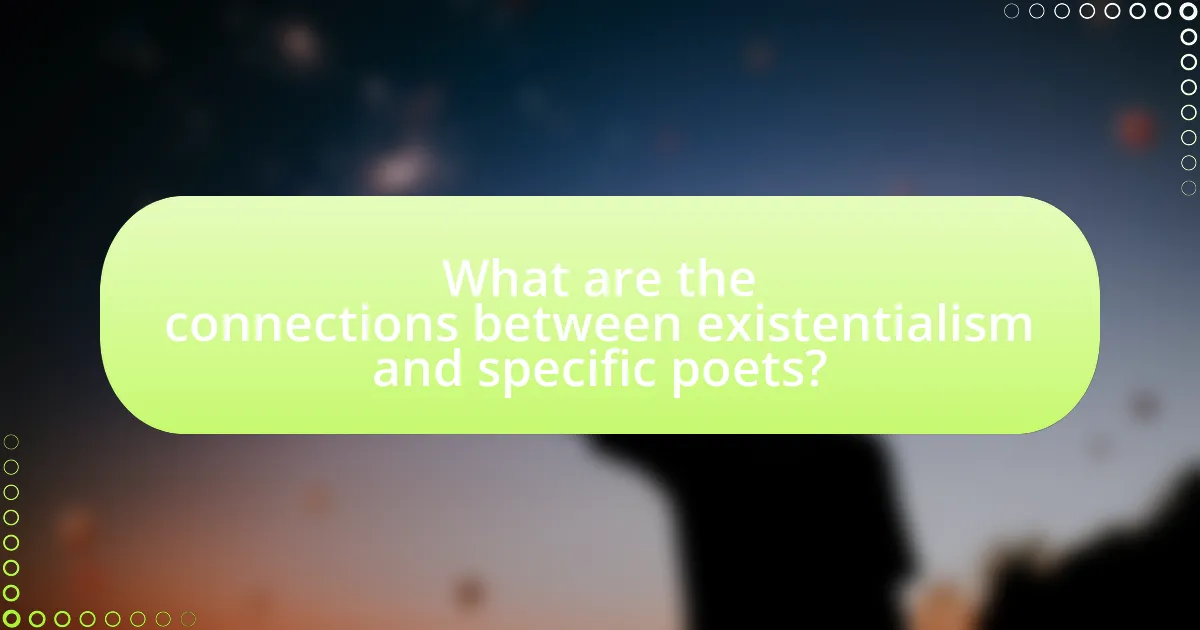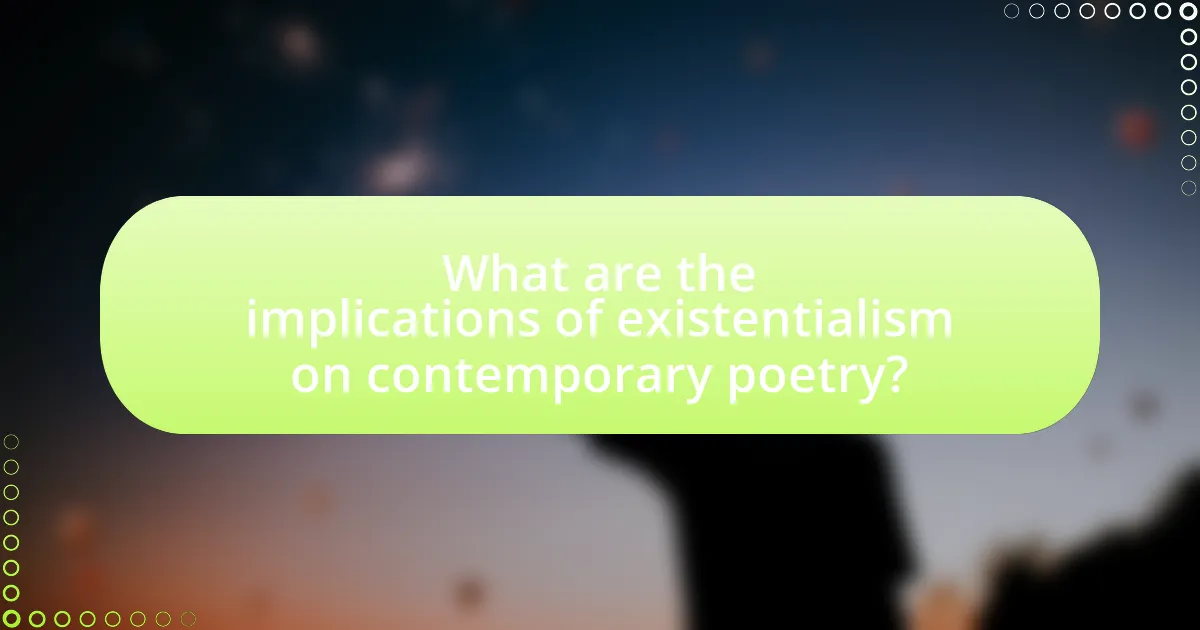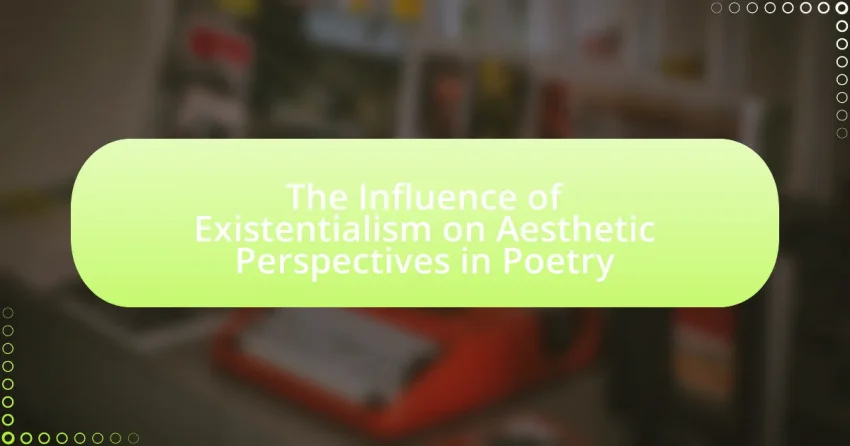The article examines the influence of existentialism on aesthetic perspectives in poetry, highlighting how this philosophical movement shapes themes of individual experience, freedom, and the search for meaning in an indifferent universe. It discusses the emergence of existentialism through key thinkers and its impact on poets such as T.S. Eliot and Sylvia Plath, who explore concepts of alienation, absurdity, and authenticity in their work. The article also analyzes the stylistic choices poets make to convey existential ideas and the implications of existentialism on contemporary poetry, emphasizing the ongoing relevance of these themes in modern artistic expression.

What is the Influence of Existentialism on Aesthetic Perspectives in Poetry?
Existentialism significantly influences aesthetic perspectives in poetry by emphasizing individual experience, freedom, and the search for meaning in an indifferent universe. This philosophical movement, associated with thinkers like Jean-Paul Sartre and Albert Camus, encourages poets to explore themes of alienation, absurdity, and the subjective nature of reality. For instance, the works of poets such as T.S. Eliot and Sylvia Plath reflect existential concerns, showcasing fragmented narratives and introspective voices that grapple with existential dilemmas. The aesthetic shift towards authenticity and personal expression in poetry aligns with existentialist ideas, as poets seek to convey the complexities of human existence and the emotional weight of choice in a seemingly chaotic world.
How did existentialism emerge as a philosophical movement?
Existentialism emerged as a philosophical movement in the late 19th and early 20th centuries, primarily through the works of philosophers like Søren Kierkegaard and Friedrich Nietzsche, who emphasized individual existence, freedom, and choice. This movement gained momentum after World War II, with key figures such as Jean-Paul Sartre and Simone de Beauvoir articulating existentialist ideas in response to the crisis of meaning and identity in a post-war context. The existentialist focus on the absurdity of life and the necessity for individuals to create their own values resonated with the disillusionment of the time, establishing existentialism as a significant philosophical framework that influenced various fields, including literature and the arts.
What are the key tenets of existentialism that relate to art and poetry?
The key tenets of existentialism that relate to art and poetry include the emphasis on individual experience, the search for meaning in an indifferent universe, and the exploration of authenticity. Existentialist thinkers like Jean-Paul Sartre and Albert Camus argue that art and poetry serve as mediums for individuals to confront their existence and express their subjective realities. For instance, Sartre’s notion of “existence precedes essence” suggests that artists and poets create meaning through their work rather than discovering pre-existing truths. This perspective encourages a focus on personal interpretation and emotional depth, as seen in the works of poets like Rainer Maria Rilke, who delves into the complexities of human existence. Additionally, existentialism often highlights themes of absurdity and alienation, which are prevalent in modernist poetry, reflecting the struggle to find significance in a chaotic world. These tenets collectively underscore the role of art and poetry as vital expressions of the human condition within the existential framework.
How do existentialist thinkers define the role of the individual in artistic expression?
Existentialist thinkers define the role of the individual in artistic expression as central and pivotal, emphasizing personal authenticity and subjective experience. They argue that art is a means for individuals to confront their existence, express their freedom, and explore the absurdity of life. For instance, Jean-Paul Sartre posits that artists must create meaning in a world devoid of inherent purpose, thus reflecting their unique perspectives and choices through their work. This notion is supported by the idea that artistic expression serves as a vehicle for self-exploration and existential inquiry, allowing individuals to navigate their own identities and the human condition.
In what ways does existentialism shape the themes in poetry?
Existentialism shapes the themes in poetry by emphasizing individual experience, freedom, and the search for meaning in an indifferent universe. Poets influenced by existentialist thought often explore feelings of alienation, despair, and the absurdity of life, reflecting the philosophical tenets established by thinkers like Jean-Paul Sartre and Albert Camus. For instance, the poetry of T.S. Eliot and Sylvia Plath illustrates existential themes through their focus on personal identity and the struggle against existential crises. These poets convey the complexities of human existence, highlighting the tension between the desire for meaning and the inherent chaos of life, thus reinforcing the existentialist perspective that individuals must create their own purpose in a seemingly meaningless world.
What existential themes are commonly found in poetry?
Existential themes commonly found in poetry include the search for meaning, the absurdity of existence, isolation, freedom, and the inevitability of death. These themes reflect the human condition and the struggle to find purpose in a seemingly indifferent universe. For instance, poets like Samuel Beckett and T.S. Eliot explore the absurdity of life and the quest for significance amidst chaos, as seen in works like “Waiting for Godot” and “The Waste Land.” Additionally, the theme of isolation is prevalent in the poetry of Sylvia Plath, who often delves into personal despair and alienation. The exploration of freedom and choice is also significant, as highlighted in the works of existentialist poets who emphasize individual agency in a world devoid of inherent meaning. Lastly, the inevitability of death is a recurring motif, prompting reflections on mortality and the transient nature of life, as illustrated in John Keats’ “Ode to a Nightingale.” These themes collectively underscore the existentialist perspective that permeates much of modern poetry.
How do poets express existential angst and absurdity in their work?
Poets express existential angst and absurdity through themes of alienation, the search for meaning, and the confrontation with the absurdity of existence. They often utilize fragmented narratives, surreal imagery, and paradoxical statements to illustrate the disconnection between human aspirations and the indifferent universe. For instance, in works by poets like Samuel Beckett and T.S. Eliot, the use of disjointed language and bleak settings reflects the struggle against an incomprehensible reality. This approach aligns with existentialist philosophy, which posits that individuals must navigate a world devoid of inherent meaning, thereby highlighting the absurdity of human existence.
How does existentialism influence poetic form and style?
Existentialism significantly influences poetic form and style by emphasizing individual experience, freedom, and the search for meaning in an indifferent universe. Poets influenced by existentialist thought often employ fragmented structures, free verse, and unconventional syntax to reflect the chaos and ambiguity of human existence. For instance, the works of poets like T.S. Eliot and Samuel Beckett showcase disjointed narratives and a focus on subjective perception, mirroring existential themes of alienation and despair. This stylistic approach allows poets to convey the complexities of human emotions and the struggle for authenticity in a world perceived as absurd.
What stylistic choices do poets make to convey existential ideas?
Poets convey existential ideas through stylistic choices such as imagery, symbolism, and fragmented structure. Imagery allows poets to evoke the complexities of human existence, illustrating themes of isolation and absurdity, as seen in the works of T.S. Eliot. Symbolism serves to represent abstract concepts like death and meaninglessness, often using objects or actions to reflect deeper philosophical questions, as exemplified in the poetry of Sylvia Plath. Fragmented structure mirrors the disjointed nature of existential thought, creating a sense of chaos and uncertainty, which is evident in the writings of Samuel Beckett. These choices effectively communicate the nuances of existentialism, engaging readers in the exploration of life’s inherent uncertainties.
How does the structure of existential poetry differ from traditional forms?
Existential poetry typically features a free verse structure, contrasting with the rigid forms of traditional poetry, such as sonnets or haikus. This flexibility allows existential poets to explore themes of absurdity, isolation, and the search for meaning without the constraints of meter or rhyme. For instance, poets like Samuel Beckett and Paul Celan often employ fragmented syntax and disjointed imagery to reflect the chaotic nature of human existence, which deviates from the orderly patterns found in traditional poetic forms. This structural choice reinforces the existential themes by mirroring the unpredictability and complexity of life itself.

What are the connections between existentialism and specific poets?
Existentialism is closely connected to poets such as Paul Sartre and Sylvia Plath, who explore themes of individual existence, freedom, and the absurd. Sartre’s poetry reflects his philosophical ideas, emphasizing the struggle for authenticity in a meaningless world, while Plath’s work often delves into personal identity and existential despair, showcasing the internal conflicts of the self. Both poets illustrate existentialist concepts through their vivid imagery and emotional depth, reinforcing the notion that poetry can serve as a medium for existential inquiry and expression.
Which poets are most influenced by existentialist thought?
Poets most influenced by existentialist thought include T.S. Eliot, Samuel Beckett, and Paul Sartre. T.S. Eliot’s works, such as “The Love Song of J. Alfred Prufrock,” reflect themes of alienation and the search for meaning, aligning with existentialist ideas. Samuel Beckett’s poetry often explores absurdity and the human condition, as seen in his collection “Collected Poems.” Paul Sartre, primarily known for his philosophical writings, also contributed poetry that embodies existentialist themes, emphasizing freedom and responsibility. These poets exemplify the intersection of existentialism and poetic expression, showcasing the profound impact of existentialist philosophy on their work.
How does the work of Jean-Paul Sartre reflect in the poetry of his contemporaries?
Jean-Paul Sartre’s work significantly influences the poetry of his contemporaries by embedding existential themes such as freedom, absurdity, and individualism. Poets like Paul Éluard and Louis Aragon incorporated Sartrean ideas, exploring the human condition and the search for meaning in a seemingly indifferent universe. For instance, Éluard’s poetry often reflects the existential belief in personal freedom and the subjective experience of reality, mirroring Sartre’s assertion that existence precedes essence. This alignment with Sartre’s philosophy is evident in the way these poets grapple with the complexities of choice and the weight of responsibility, showcasing a shared commitment to existential inquiry in their artistic expressions.
What existential themes are present in the poetry of Sylvia Plath?
Sylvia Plath’s poetry prominently features existential themes such as identity, alienation, and the search for meaning. These themes manifest through her exploration of the self in relation to societal expectations, often highlighting feelings of isolation and despair. For instance, in her poem “Lady Lazarus,” Plath grapples with the concept of rebirth and the struggle against existential annihilation, illustrating her confrontation with mortality and the quest for personal agency. Additionally, her work frequently reflects a deep sense of disconnection from the world, as seen in “The Bell Jar,” where she articulates the suffocating nature of societal roles and the resulting existential crisis. Plath’s vivid imagery and confessional style serve to underscore these themes, making her poetry a profound exploration of the human condition within an existential framework.
How do existentialist poets address the concept of meaning?
Existentialist poets address the concept of meaning by exploring the inherent absurdity of life and the individual’s quest for personal significance. They often depict characters grappling with existential dilemmas, emphasizing the subjective nature of meaning rather than any universal truths. For instance, poets like Samuel Beckett and Paul Celan illustrate the struggle against nihilism and the search for authenticity in a seemingly indifferent universe. Their works reflect the belief that meaning is not given but must be created through personal experience and choice, as seen in Beckett’s “Waiting for Godot,” where the characters’ actions highlight the futility and yet the necessity of finding purpose in a chaotic existence.
What techniques do poets use to explore the search for meaning in a chaotic world?
Poets use techniques such as imagery, symbolism, and stream of consciousness to explore the search for meaning in a chaotic world. Imagery allows poets to create vivid mental pictures that evoke emotions and provoke thought, helping readers to navigate complex feelings associated with chaos. Symbolism provides deeper layers of meaning, where objects or actions represent larger existential themes, facilitating a connection between the personal and universal. Stream of consciousness captures the fluidity of thought, reflecting the disordered nature of human experience and allowing readers to engage with the chaotic flow of ideas and emotions. These techniques collectively enable poets to articulate the struggle for meaning amidst uncertainty, as seen in works by poets like T.S. Eliot and Sylvia Plath, who grapple with existential questions through their poetic forms.
How do existentialist poets reconcile personal experience with universal themes?
Existentialist poets reconcile personal experience with universal themes by exploring individual emotions and existential dilemmas that resonate broadly with the human condition. They often draw from their own struggles with identity, freedom, and meaning, using these personal narratives to highlight shared existential concerns. For instance, poets like Jean-Paul Sartre and Samuel Beckett illustrate feelings of alienation and absurdity, which reflect universal themes of existence and the search for meaning. This connection is evident in Sartre’s poetry, where personal anguish serves as a lens through which readers can understand broader existential questions, thus bridging the gap between the individual and the collective human experience.

What are the implications of existentialism on contemporary poetry?
Existentialism significantly influences contemporary poetry by emphasizing themes of individual experience, absurdity, and the search for meaning in a seemingly indifferent universe. Poets often explore the complexities of human existence, reflecting on personal identity and the struggle against existential despair. For instance, the works of contemporary poets like Sylvia Plath and Charles Bukowski illustrate the existential crisis through vivid imagery and introspective language, showcasing the tension between personal freedom and societal constraints. This focus on subjective experience aligns with existentialist philosophy, particularly the ideas of Jean-Paul Sartre and Albert Camus, who argue that individuals must create their own meaning in a chaotic world. Thus, existentialism shapes contemporary poetry by fostering a deeper exploration of the human condition and the inherent struggles within it.
How has existentialism influenced modern poetic movements?
Existentialism has significantly influenced modern poetic movements by emphasizing themes of individual experience, absurdity, and the search for meaning in a seemingly indifferent universe. Poets such as Sylvia Plath and Allen Ginsberg have incorporated existentialist ideas, reflecting personal struggles and societal alienation in their works. For instance, Plath’s poetry often explores the inner turmoil and existential dread faced by individuals, while Ginsberg’s “Howl” critiques societal norms and expresses a quest for authenticity. This alignment with existentialist philosophy has led to a deeper exploration of the human condition in contemporary poetry, showcasing the impact of existential thought on artistic expression.
What role does existentialism play in postmodern poetry?
Existentialism plays a significant role in postmodern poetry by emphasizing themes of individual experience, absurdity, and the search for meaning in a fragmented world. Postmodern poets often draw on existentialist ideas to explore the complexities of human existence, reflecting the disillusionment and uncertainty characteristic of contemporary life. For instance, poets like Charles Bukowski and Sylvia Plath incorporate existential themes, portraying the struggles of identity and the quest for authenticity amidst societal chaos. This alignment with existentialism allows postmodern poetry to challenge traditional narratives and embrace ambiguity, thereby resonating with readers who grapple with similar existential dilemmas.
How do contemporary poets reinterpret existential themes for today’s audience?
Contemporary poets reinterpret existential themes for today’s audience by addressing modern anxieties and uncertainties through relatable language and imagery. They explore concepts such as identity, isolation, and the search for meaning in a rapidly changing world, often reflecting the complexities of contemporary life. For instance, poets like Ocean Vuong and Claudia Rankine incorporate personal narratives and social issues, making existential questions more accessible and relevant. This approach resonates with readers who face existential dilemmas in the context of technology, globalization, and social justice, thus bridging the gap between classic existential philosophy and current societal challenges.
What practical insights can be drawn from the influence of existentialism on poetry?
Existentialism profoundly influences poetry by emphasizing individual experience, freedom, and the search for meaning in an absurd world. This philosophical framework encourages poets to explore themes of alienation, authenticity, and the human condition, leading to a more introspective and personal style of writing. For instance, poets like T.S. Eliot and Sylvia Plath reflect existential themes in their works, showcasing the struggle for identity and the confrontation with despair. The practical insight drawn from this influence is that poets can utilize existentialist concepts to deepen emotional resonance and connect with readers on a fundamental level, as seen in the raw honesty of Plath’s “Lady Lazarus,” which embodies the existential struggle against societal expectations and personal trauma.
How can poets incorporate existential themes into their own work effectively?
Poets can effectively incorporate existential themes into their work by exploring concepts such as absurdity, freedom, and the search for meaning. By delving into the human condition and questioning existence, poets can create a profound emotional resonance. For instance, using imagery that reflects isolation or the struggle against an indifferent universe can evoke existential angst. Notable poets like Samuel Beckett and T.S. Eliot have utilized fragmented narratives and ambiguous language to mirror the complexities of existence, demonstrating that such techniques can enhance the exploration of existential themes. This approach allows poets to engage readers in a dialogue about life’s inherent uncertainties, making the themes more relatable and impactful.
What are some common challenges poets face when exploring existential ideas?
Poets often face the challenge of articulating complex existential concepts, such as the nature of existence, meaning, and individual freedom, in a way that resonates with readers. This difficulty arises from the abstract nature of existential themes, which can lead to ambiguity and misinterpretation. Additionally, poets may struggle with the emotional weight of existential ideas, as they often evoke feelings of despair, isolation, or anxiety, making it challenging to convey these sentiments effectively without overwhelming the audience. Furthermore, the philosophical depth required to engage with existentialism demands a high level of intellectual rigor, which can be daunting for poets aiming to balance artistic expression with philosophical inquiry.
